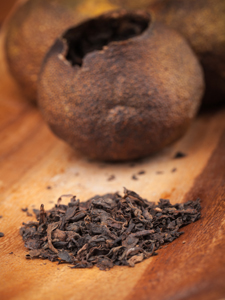Tea's Benefits Now Extended to Anti-Aging

IMPACT ON METABOLIC SYNDROME Pu-erh is particularly helpful in addressing metabolic syndrome issues. Researchers at the Graduate School of Integration of Chinese and Western Medicine, Beijing Medical University, studied 90 patients with the syndrome. Half the group were given a pu-erh tea extract, the other half took a placebo. Body Mass Index (BMI), cholesterol, triglycerides, and other factors were significantly decreased for those taking the pu-erh; the group with the placebo did not fare well and, in some cases, the metabolic factors increased over the three-month-long study. The scientists concluded that pu-erh has potential to adjust blood lipid, lower blood sugar, regulate immunity, and improve weight loss.
MEMORY AND SPATIAL NAVIGATION In another study by Chinese researchers, published in "Food Chemistry," mice were studied for their long term memory and spatial navigation. Extracts of ripened and raw pu-erh teas were given to the mice over a period of four weeks, and the concluding data indicated that the tea reversed immunosenescence by restoring the immune deficiency and decreasing inflammation. Scientists suggest that vitamin E supplementation, carefully monitored diet, and exercise can also stave off infection and inflammatory illnesses and may well prolong life in humans.
PREVENTING DEMENTIA Pu-erh is not the only type of tea to be beneficial to aging concerns. Both black and green teas are helpful primarily because of their powerful antioxidants that offer a benefit to reverse dying nerves. Catechins also increase the strength of the immune system. When the immune system is strong, it boosts overall health by making it more difficult for infection or disease to take hold, so this latest observation may become even more reason to drink tea on a regular basis. Scientists at the Institute of Neurosciences, Mental Health and Addiction (CIHR), discovered that both black and green tea extracts "strongly blocked death of neurons" and the study is the first to show "this beneficial effect from both green and black teas" on neurons. The scientists used altered nerve cells, aka neurons, and exposed them to amyloid, a protein thought to be a cause of Alzheimer's Disease. When exposed to amyloids, the neurons died. However, when tea extracts and additional catechin antioxidants were introduced, these altered neurons survived. These results "clearly show a pivotal protective role" of catechins in the nervous system," said the lead author, Stephane Bastianetto. "Although we haven't conducted human clinical experiments, this research does suggest that a regular consumption of tea, green or black, may reduce the risk of neurodegenerative disease such as Alzheimer's."
While it is true that no Chinese pu-erh maker would ever reveal the secrets to making his or her fine, aged tea, there has been an assumption that a "beneficial" bacteria gives this tea its rich, earthy, deep flavor as it ages from delicate green to dark leaves. The most prized pu-erh still comes from southern Yunnan, China, an area well known for its rich plant and animal life. Adagio has both plain and flavored pu-erhs, and loose leaf and teabag selections. We think one of the most charming ways to consume this powerful tea is pu-erh pearls. These tiny balls, or pearls, have been shaped in the ancient shou (ripe) style and allowed to age for at least five years. The result is an earthy cup that is smooth, deep, and satisfying like few others. This high-quality selection offers several steepings. Steep for five minutes with boiling water 212° F. NOTE: Ripe or shou pu-erhs are intentionally warmed as they age which makes the tea smooth, almost without any astringency, and lusciously mellow. Raw pu-erh, while enjoyed by many, is considerably more astringent and, if drunk too early in its aging process, will not have the characteristically deep smooth essence of ripe pu-erhs.
